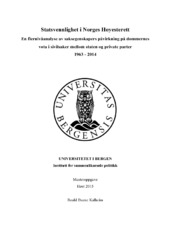| dc.description.abstract | This thesis examines the influence of case characteristics on the behavior of Norwegian Supreme Court justices when the state appears as a party in civil cases. Acting as the highest court of appeal, the Supreme Court has jurisdiction in all areas of law, and hears cases that raise matters of principle beyond the actual case itself, where the law is unclear. Statistically, the Supreme Court decides cases in favor of the state more often than private party litigants. This fact has led to debate within the legal community, over whether or not the court is placing greater emphasis on the state's interests than what follows from the legal doctrine. While research on Norwegian Supreme Court justices has produced important insights about the effects of individual justice characteristics, little is known about how aspects of the actual cases affects judicial behavior. Here, I investigate variables connected to case categories and importance, results from lower courts, the character of the different parties and their legal counsel. Using a multilevel model that control the effects of these case characteristics against panel effects connected to the collegial nature of the court, and also includes the individual characteristics of the justices, all 834 cases with 4170 justice votes between 1963 and 2014 are analyzed. Firstly, the results show that the history of the case matters: In cases where the state party won in both the District Courts and the Courts of Appeal, the justices are more probable to vote in favor of that party. This effect is not evident for private parties with the same case history. Secondly, the Ministry of Finance is identified as a uniquely strong plaintiff. Differently from other actors, an appeal from the Ministry of Finance increases the probability of the justices to vote in favor of the state. Additionally, the analysis confirms the existence of panel effects and individual effects on the Supreme Court: In panels where justices with former employment with the Legislation Department make up the majority, all justices are more likely to vote in favor of the state. Individual justices with former employment with the Legislation Department or the Office of the Director of Public Prosecutions, interim justices and former lower court justices are more likely to vote for the state party. Former law professors and the chief justices are more likely to vote in favor of the private party. Although a growing field of research, the Norwegian Supreme Court is still severely understudied. | en_US |
